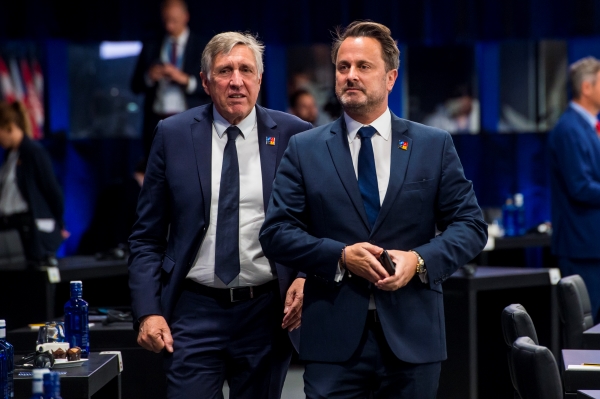 (L-R) François Bausch, Deputy Prime Minister, Minister of Defence; Xavier Bettel, Prime Minister, Minister of State;
Credit: NATO
(L-R) François Bausch, Deputy Prime Minister, Minister of Defence; Xavier Bettel, Prime Minister, Minister of State;
Credit: NATO
From Tuesday 28 to Thursday 30 June 2022, Luxembourg's Prime Minister Xavier Bettel, the Deputy Prime Minister and Minister of Defence, François Bausch, and the Minister of Foreign and European Affairs, Jean Asselborn, took part in the NATO Summit in Madrid, Spain.
During this summit, marked in particular by the Russian invasion of Ukraine, the milestones of future Euro-Atlantic defence were presented.
In Madrid, the Heads of State and Government notably adopted NATO's new Strategic Concept 2022, which enables the Alliance to equip itself with the means and guidelines necessary to face current and future security challenges. This document defines NATO's common positions and its main strategic orientations for the next decade in the face of threats and challenges to Allies, wherever they come from. The 2022 Strategic Concept clearly defines Russia as the most significant and direct threat to Euro-Atlantic security but also considers other emerging risks.
The Allies have also adopted a new posture of deterrence and defence, taking into account the geopolitical situation disrupted by Russian aggression. With the ability to rapidly deploy robust and credible combat forces to the Alliance's eastern flank, NATO will be able to react more quickly and effectively to defend its territory and prevent any potential aggressor from achieving its objectives. “Faced with Russian aggression in Ukraine and the serious deterioration of the security context in Europe, the adoption of a new posture of deterrence and advanced defence of the Alliance is more necessary than ever. Luxembourg will assume its part in this common effort and we welcome the new focus of the posture of deterrence and advanced defence”, said Prime Minister Bettel.
Climate change is a reality and constitutes one of the greatest challenges of our time, including in the field of security and defence. To better measure the climate impact of military activities, Allied Heads of State and Government endorsed a new method for mapping greenhouse gas emissions and the goal of net zero emissions through 2050 and a 45% reduction in emissions by 2030. “To tackle the problem of climate change, it is important to take appropriate measures immediately, to measure our greenhouse gas emissions, to improve sustainably our climate balance and to rely on innovative green technologies and forms of propulsion. Luxembourg is already active in this area and I am delighted that the subject is now recognised at its fair value at the international level”, concluded Minister Bausch.
In order to stay at the cutting edge of technology, the leaders of the NATO countries have established a NATO Innovation Fund, which will be domiciled in Luxembourg and will be endowed with €1 billion. This fund will make it possible to invest in startups and guarantee technological superiority. In this context, Prime Minister Bettel underlined the importance of the technologies of the future: “We must absolutely preserve our technological advantage because it will be critical in the future both for our security and for our economic development. I therefore welcome the launch of the NATO Innovation Fund, which officially took off on Thursday 30 June, following the signing ceremony. Our commitment will be twofold: we will host the fund as a domicile and also contribute to joint investments”.
The Summit was then an opportunity for the Allies to reaffirm NATO's open door policy, after the green light given by the leaders of the NATO member states to the accession of Finland and the Sweden: “I welcome the agreement between Turkey, Sweden and Finland as well as the lifting of the Turkish blockade, which therefore definitely opens the way for Finland and Sweden to join NATO. This is a truly historic moment, which is further proof – if one were needed – that Russia's war in Ukraine was a strategic mistake. NATO is more united and stronger than ever”, said Minister Asselborn.
Moreover, for the first time, the Heads of State and Government of key NATO partners, Australia, Japan, New Zealand and the Republic of Korea were invited to participate in such a summit. The European Union (EU), Georgia, Finland and Sweden were also present, as were Bosnia and Herzegovina, Jordan and Mauritania. In particular, Minister Asselborn and his NATO counterparts had an informal exchange of views with the Foreign Ministers of Jordan and Mauritania, which allowed them to examine NATO's partnership and cooperation with its southern partners. Jordan and Mauritania are considered to play an essential role for stability in the Middle East, respectively in the Sahel.
Since the Russian invasion of Ukraine, NATO member states have already provided considerable assistance to Ukraine, both military and financial, in order to give the country the means to exercise its legitimate right of defence. At the summit, which was also attended by the President of Ukraine, NATO Heads of State and Government agreed to maintain and coordinate NATO support for Ukraine in the long term. “Volodymir Zelensky's participation in this summit is a strong signal of our determination to remain at Ukraine's side. The President confirmed to us his determination and that of the Ukrainian people to continue the fight against Russian aggression. Russian aggression is a cruel reminder that freedom is not automatic, but comes with a price. The Ukrainian people are today paying a high price for the defence of our values. We must support this fight, act quickly and over time, in short, combine the double sprint with the marathon”, said Prime Minister Bettel.








